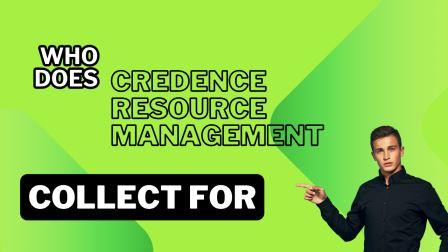Credence Resource Management typically collects for:
- Telecom
- Utilities
- Healthcare
- Retail
- Insurance
Have you ever received a call from Credence Resource Management (CRM)? If you have outstanding debt, this might be the reason. But who exactly does Credence Resource Management collect for?
This blog post dives into the world of CRM, unpacking who they represent and what types of debt they typically handle. We’ll also explore some key points to remember if you receive a call from them.
Who Does Credence Resource Management Collect For?
Credence Resource Management isn’t the original creditor you owe money to. They function as a third-party debt collector. This means that the original creditor, like a credit card company or utility provider, has likely sold your debt to CRM at a discounted price. Now, CRM takes on the responsibility of collecting the full amount from you.
Here’s a breakdown of the creditors Credence Resource Management typically collects for:
- Telecom: Mobile phone bills, internet service providers, cable companies
- Utilities: Electricity, gas, water bills
- Healthcare: Medical bills, hospital fees
- Retail: Unpaid store accounts, credit card debt (in some cases)
- Insurance: Unpaid insurance premiums
It’s important to note that this list isn’t exhaustive. Credence Resource Management might collect on behalf of other creditors as well.
Beyond the Phone Call: What Does Credence Resource Management Collect For?
While a Credence phone call might be the first sign of their involvement, their job goes beyond just making calls. Here’s what their debt collection process might entail:
- Sending Letters: CRM will likely send you initial letters outlining the debt, the original creditor, and the current amount owed.
- Negotiating Payment Plans: If you’re struggling to pay the full amount, they might be willing to negotiate a payment plan that works for your budget.
- Reporting to Credit Bureaus: Unpaid debts reported to credit bureaus can significantly damage your credit score for several years.
Dealing with a Credence Debt Collection Call: Your Rights and Options
If you receive a call from Credence Resource Management, here are some things to keep in mind:
- Verify the Debt: Before making any payments, it’s crucial to verify the legitimacy of the debt. Ask for written verification of the debt details, including the original creditor, amount owed, and any late fees.
- Know Your Rights: The Fair Debt Collection Practices Act (FDCPA) restricts how debt collectors can contact you. They cannot harass you, threaten you, or use misleading tactics. Familiarize yourself with your rights under the FDCPA.
- Communicate Clearly: Maintain open communication with CRM. Explain your financial situation and explore options for resolving the debt.
- Consider Credit Counseling: Non-profit credit counseling agencies can provide guidance on managing your debt and negotiating with creditors.
Conclusion: Understanding Credence Resource Management and Your Options
While a Credence Resource Management call can be stressful, understanding who they collect for and your rights as a debtor empowers you to navigate the situation effectively. Remember, open communication and seeking professional help if needed can be crucial steps in resolving debt.
If you’re unsure about the legitimacy of a Credence phone call or have concerns about their collection practices, don’t hesitate to seek legal advice or contact the Federal Trade Commission (FTC).
See Also- Credence Resource Management: A Comprehensive Guide
